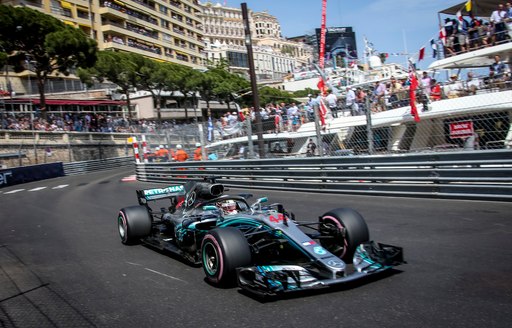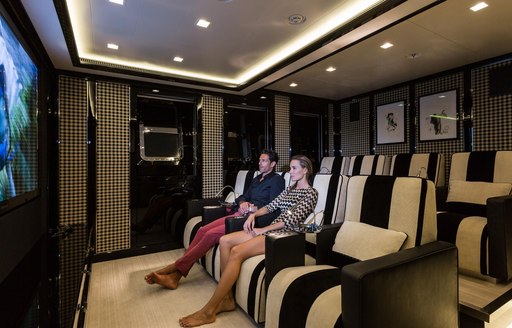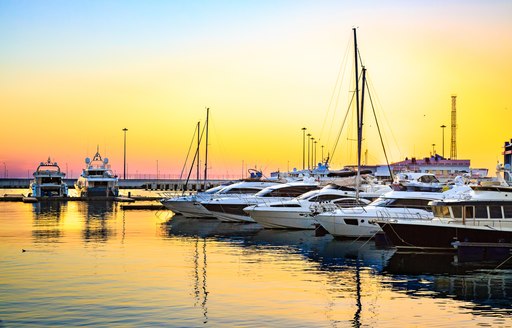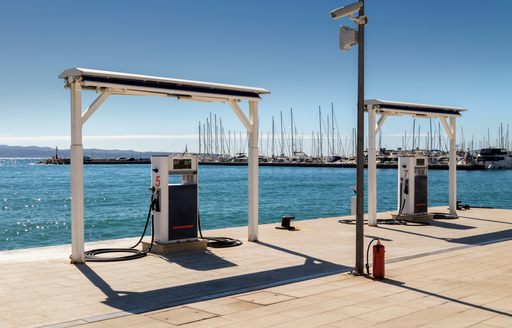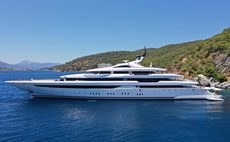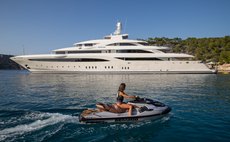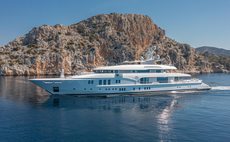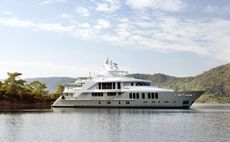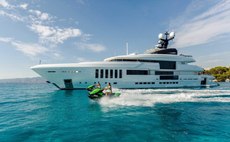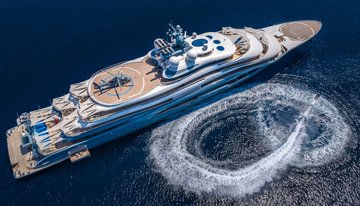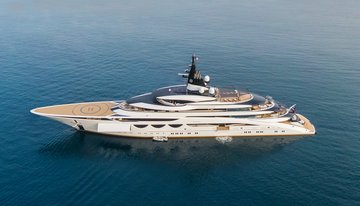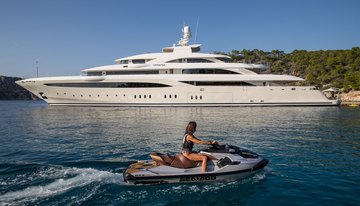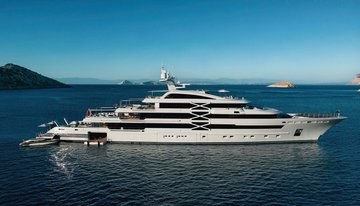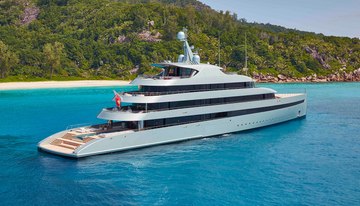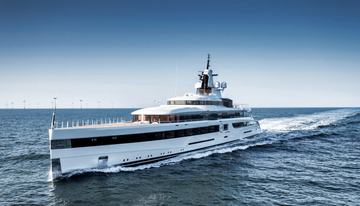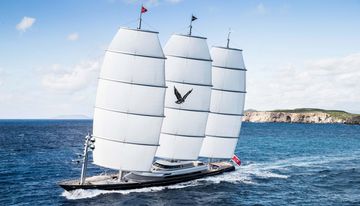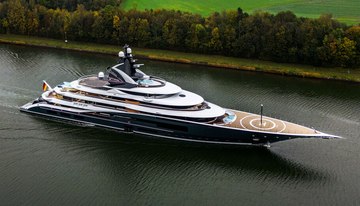In this article:
Planning a yacht charter is thrilling yet challenging, particularly when it comes to budgeting. The starting point is the yacht's base price, the weekly rental fee. But what about additional costs such as meals, beverages, local taxes, or fuel? How do these affect the overall cost?
The encouraging part is that understanding yacht charter fees is straightforward. With guidance from our seasoned professionals, you can gain a clearer idea of the expenditure for your dream vacation.
Yacht charter costs vary based on several elements: the yacht type, destination, local taxes, dates and the age of the yacht.
Yacht charter prices span a broad spectrum. For instance, smaller sailing yachts and catamarans may start at around $10,000 per week, whereas more luxurious motor superyachts can exceed $100,000 per week.
Wondering about other expenses? Our Charter Advice Guide, a key part of our planning resources, delves deep into the specifics of yacht charter costs.
After you have chosen your desired yacht, your yacht broker will prepare a legally binding contract; usually a standard agreement with conditions set by the terms applicable to the destination. Before you sign on the dotted line, it is important that you understand what it is that you are paying for and when it is due.
When it comes to crewed luxury yacht charters, you can choose from two types of vacations- "All-Inclusive" or "Plus Expenses" charter experiences. But what do these classifications entail?
Let's briefly compare:
- All-Inclusive Yacht Charters
Certain charters, particularly small catamaran and monohull sailboat charters in the Virgin Islands, wooden Gulets in Turkey or Phinisis in Indonesia, offer different all-inclusive pricing packages. This means that the rates depend on the number of guests and cover some or all meals and beverages, water sports, and fuel expenses. However, dockage fees and taxes are typically billed as additional costs.
- Plus Expenses Charters
The rates for larger sailing or motor yachts are exclusive of operational costs, which are to be paid additionally. With these high-end charters, the base rate covers only the yacht rental. Extra charges, such as for food, beverages, fuel, dockage, port taxes, and other expenses, are billed separately. These running costs are usually covered by an Advance Provisioning Allowance (APA) payment, generally set at 20-35% of the base charter rate depending on the size and location of the yacht. This amount is paid before the start of the charter.
The table below gives a quick comparision of what is generally included in the price for both charter types.
>
| All Inclusive | Plus Expenses | |
| Yacht Rental | ||
| Yacht Insurance | ||
| Crew Salaries | ||
| Crew Food | ||
| Taxes / VAT | ||
| Water Toys | ||
| Guest Food | ||
| Guest Drinks | ||
| Alcohol | Check Package | |
| Fuel | ||
| Electric | ||
| Dockage | ||
| Airport Transfers | ||
| Crew Gratuity (Tips) | ||
| Misc Charterer Expenses |
In essence the base charter fee refers to the hire cost of the yacht itself, and implies that the yacht will be provided to you in full commission, with all equipment in working order and the yacht properly insured for marine risks.
In addition, the cost of the crew’s food, wages and clothing will be met by the owner for the entirety of the charter.
Charter rates are typically quoted per week (7 days), which in superyacht terms is generally accepted as the minimum period for yacht charters – although this is by no means set in stone.
The APA in Plus Expenses charters is typically about 25-40% of the yacht's base weekly charter rate (based on the size of yacht, location and yacht's fuel efficiency). This fee is collected before the start of the charter and acts like an expense fund that the captain can utilize during the trip to cover costs such as fuel, food and beverages, dockage fees and ad hoc incidental expenses. At the end of the charter the captain will prepare a detailed statement of the APA expenditures, along with any unspent APA funds returned in cash.
Should expenses exceed the initial APA, you might need to top up the fund during the charter. This replenishment can be done in cash, but many opt to establish accounts with their charter brokers. These accounts can then be accessed upon the captain's request for additional funds.
For most yachts, regardless of being All-Inclusive or Plus Expenses, local taxes or Value Added Tax are NOT incorporated into their charter rate. It falls upon the charterer to pay these tax expenses before the charter commences.
Tax rates can vary greatly depending on the destination; here's an brief overview of tax rates in some of the most sought-after yachting locations:
In the European Union (EU) recent harmonising changes to tax laws have affected VAT rates across most of the Mediterranean region. EU tax laws state that VAT will apply to vessels embarking or disembarking within their waters, although rates for VAT vary depending on the European destination. In France the current rate is 20% and in Italy it is 22%, whilst Turkey and Montenegro both charge 0% for EU-flagged yachts cruising their waters.
VAT also applies to yacht charters cruising The Bahamas, plus may also apply in some Caribbean islands.
Please consult your yacht charter broker for further personalized advice if considering chartering in any of these areas.
Charter Free: £100,000 p/w +30% APA + 14% TAX/VAT
 |
The Bahamas | 14% | Tax: 4% plus 10% VAT |
 |
BVI | 0% | Tax: between $6 and $16 per person per day, depending on the flag of the boat |
 |
Croatia | 13% | VAT: 13% |
 |
Florida - Broward County | 6-7% | Tax: 6% |
 |
Florida - Miami-Dade | 6-7% | Tax: 7% |
 |
France | 20% | VAT: 20% |
 |
Greece | 12% | VAT: 12% |
 |
Italy | 22% | VAT: 22% |
 |
Montenegro | 0% | NO VAT |
 |
New England | 0% | NO TAX |
 |
Spain | 21% | VAT: 21% |
 |
Turkey | 20% | Turkish flagged boats |
 |
Norway | 12% | VAT: 21% |
 |
Maldives | 12% | GST: 12-16% |
 |
Australia | 10% | GST: 10% |
 |
New Zeazland | 15% | GST: 15% |
Although tipping is optional, it's customary to leave a gratuity for the crew. The typical range for tips is between 10-20%, and it should reflect the quality of service you and your guests experienced during your yacht charter.
It's best practice to hand over crew gratuities to the captain for distribution, ensuring that every crew member is fairly recognized. This approach is important because there are often less visible crew members, like the engineer and sous chef, working diligently behind the scenes to guarantee the success of your charter. It would be unfair for their contributions to go unrecognized.
Charterers have the option to buy cancellation and curtailment insurance, akin to travel insurance. This insurance can provide coverage for costs in case the charter needs to be canceled or shortened. Charter brokers are equipped to assist in evaluating different insurance choices and typically offer a variety of options.
These fees are not typical for most charters, but if your charter takes place outside the yacht's regular cruising territory or a significant distance from its homeport, you might need to pay delivery fees. Usually, this will just involve covering the fuel costs for the journey.
The charter fee varies from one yacht to another for a number of reasons, such as its size, age, onboard amenities and time of year the yacht is chartered. We've listed below some of the most common factors that affect the base rate of a rental yacht.
A yacht charter season can refer to the weather patterns of a particular destination or the peak times when demand for charter yachts is at its highest. Yacht charter seasons, therefore, are broken down into two distinct categories: Summer/Winter, and High/Low season.
In terms of the yacht's base charter fee, high season rates will apply to the most popular periods for yacht charters – such as July and August in the Mediterranean or Christmas and New Year in the Caribbean. Low season rates will generally apply to all other periods.
Major events such as the Monaco Grand Prix and Cannes Film Festival are generally categorised as high season events, regardless of where they fall in the season, with yacht prices generally higher around these dates due to popular demand.
Unless you are keen to charter a yacht for a particular high season event, it is worth considering your dates carefully.
The months straddling the high and low seasons are known as shoulder months, for example April and September for yacht charters around the Mediterranean, and can share much of the same weather and beautiful cruising conditions as the peak season whilst charter rates tend to be lower, making these months a great time for chartering a yacht.
Aside from seasons and events, yachts of the same size can often differ in price based on their onboard amenities. A yacht which boasts a cinema or lavish water toys may have a higher base rate compared with a yacht with minimal amenities of the same size.
If the pricing is unclear, be sure to ask your yacht broker to explain any disparities.
Once you are clear on the base charter fee of your chosen yacht, it is important to learn about the additional costs that will be applied on top, depending on the type of charter contract used.
The most widely used contract for yacht charters is a MYBA agreement (Worldwide Yachting Association, formerly known as Mediterranean Yacht Brokers Association), which operates under Western Mediterranean Terms (WMT) .
This contract, often referred to as a "plus all expenses" contract, requires that you pay for items, such as fuel, delivery fees, food and drink, local taxes and dockage fees, as an additional expense applied over the base charter fee.
Typically, a charter party (this is the collective term for the total number of guests on a charter) will accumulate additional costs of between 25% to 30% of the base charter fee, depending on what is consumed. These expenses can be tracked through the use of an Advance Provisioning Allowance (APA) which we will cover in the next section.
Caribbean Terms Inclusive (CTI) – sometimes referred to as Standard Caribbean Terms (SCT) – is another contract regularly used by the yachting industry, the terms of which are generally employed by smaller yacht charters in the Caribbean.
Otherwise known as a "mostly all-inclusive" agreement, CTI differs from Western Mediterranean Terms as it includes three meals, plus up to four hours cruising, per day.
In addition to the commonly used MYBA terms and Caribbean Terms Inclusive, there are also less frequently used terms such as Standard Eastern Mediterranean Terms (SEMT) and Greek Terms (GT).
SEMT operates much in the same way as CTI, except it includes only two meals per day for guests instead of three, as it is assumed guests will dine ashore in the evenings. Greek Terms are similar to the MYBA terms apart from harbour and berthing fees, which are included under GT terms so long as they are within Greek waters.
If you are unsure what is included under the terms of your contract, be sure to ask your yacht charter broker.
For more in-depth information, please see our guide on yacht charter contracts below.
Typically, the APA accrues to approximately 25% to 30% of the base charter fee, though this does of course depend on your charter party’s tastes and requirements and could be far less or far greater than this estimation. For instance, charter guests who intend to regularly dine on caviar and vintage wine can expect to pay more, whereas guests on a sailing yacht charter that is anchored at sea for most nights can expect to save on fuel costs and hefty marina fees.
You can request an APA estimate from your yacht broker based on your charter party's onboard expectations.
The APA is payable one month prior to boarding the charter yacht (see 'Payment Structure' below), and is generally paid direct to the Captain.
Once the APA has been paid it will then be retained as a bank account of sorts, from which the Chef can provision the yacht ready for your charter and the Captain can make expenditures while keeping a strict record of what has been spent. It is important to note that all additional costs incurred throughout the charter are charged at cost with no mark-up.
At any point during the vacation you can request an up-to-date summary of the accounts as a way of keeping track of expenditures.
When you think of fuel costs, you may think of what is consumed by the yacht over the course of your charter.
However, there are further fuel costs to take into account that you may not have considered. These include;
- Personal watercraft toys, such as jet skis
- Tender boats used for transporting guests to and from the yacht, or for water sports activities
- A yacht's generators whilst at anchor (shore-side electricty is used when docked at a marina)
Furthermore, the distance travelled and the speed at which the yacht cruises also affects the overall fuel costs, so it is important to bear these factors in mind when settling on your itinerary.
These may vary widely depending on the destination and time of year from minimal to extravagant (think Port Hercule in Monaco during the Grand Prix).
If you are interested in booking any nights in marinas during your yacht charter, you should liaise with your broker who can advise on the various options available, including prices, around your chosen location and dates.
In general, the base charter fee of a yacht will include insurance for marine risk and third party liability insurance, which covers accidental damage and personal injury. It will also cover use of the yacht's watertoys and equipment.
Although insurance is not generally connected to charter costs, it is useful to consider should you wish to take out additional insurance such as Cancellation and Curtailment cover which is calculated at 2.5% of the charter fee for the unforeseen cancellation of a charter, and can prove a worthwhile investment as well as providing peace of mind.
You should check with your broker about the level of insurance built into your charter contract before signing.
Local taxes may also apply in certain countries, therefore it is important to speak with your yacht charter broker to clarify what additional taxes are applicable to your chosen destination and itinerary.
Whilst the payment structure can vary depending on the contract, in general charter payments are made as follows;
- 50% of the charter fee is payable upon signing the charter agreement, which confirms the booking.
- The remaining 50% of the charter fee, APA (usually between 25-30% of the base charter fee), delivery and/or re-delivery fees, applicable taxes, plus any additional agreed amounts are payable one month prior to commencement of the yacht charter.
- Any balance of monies due are to be paid on the first working day prior to completion of the yacht charter.
For further clarification of the payment structure for your yacht charter, please speak with your broker.
The base charter fee for a yacht can differ for a number of reasons, including;
- Size and age of the yacht
- Onboard amenities
- High/low seasons, and major events such as the Monaco Grand Prix
There will also be additional amounts to pay on top of the yacht's base charter fee, which can include;
- Advanced Provisioning Allowance (roughly 25-30% of the yacht's base fee and includes all charter expenditure such as food, fuel and marina fees)
- Additional insurance, such as Cancellation and Curtailment Insurance
- VAT and other taxes
- Crew gratuities
It is important for you to understand the entire payment structure to ensure no unpleasant surprises arise whilst enjoying your vacation.
If you wish to know more about costs relating to your yacht charter, please speak with your preferred yacht broker for more information.
Related advice articles




